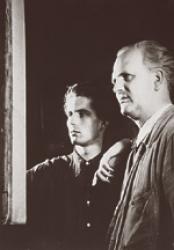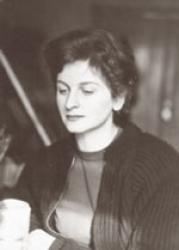Parental Separation
 Edgar and Michael Ende viewing a painting - a rare joint photograph of father and son
Edgar and Michael Ende viewing a painting - a rare joint photograph of father and son Lotte Schlegel, 1956
Lotte Schlegel, 1956Edgar Ende’s time as a forgotten artist seemed to be over. In 1949 he was asked to organize Munich’s biggest art exhibition and was subsequently elected president for three years in succession - a position that gave him scant time to further his artistic career. A year later he numbered among the founders of the German Artists’ Union. Ultimately, though, his hopes for an artistic breakthrough would be disappointed. The era of abstract art was dawning, and Edgar Ende’s paintings proved difficult to sell. The debates conducted between father and son soon became more intense, developing into quarrels. Michael Ende challenged his father’s opinions with ideas of his own, and their views on art began to diverge. Edgar Ende found this difficult to accept, and later cited their disputes as part of the reason for his departure. Michael Ende was deeply hurt by the implied reproach.
In 1953 Michael Ende was confronted with the situation he had been dreading since childhood: his father left the family home to move in with one of his pupils, Lotte Schlegel.
Ende had known that his parents’ marriage was in tatters and had done everything in his power to keep the family together, but his hopes of a reconciliation were in vain. This time there was nothing to be done, and his father’s departure for no. 26 Schellingstraβe was a source of much grief. After the split, Michael Ende became responsible for the household’s financial and emotional welfare. For Luise Ende, the separation was a devastating blow - her husband had survived the war and had attained some financial stability, only for him to leave her for a younger woman. She attempted to take her life on several occasions by overdosing on sleeping pills.